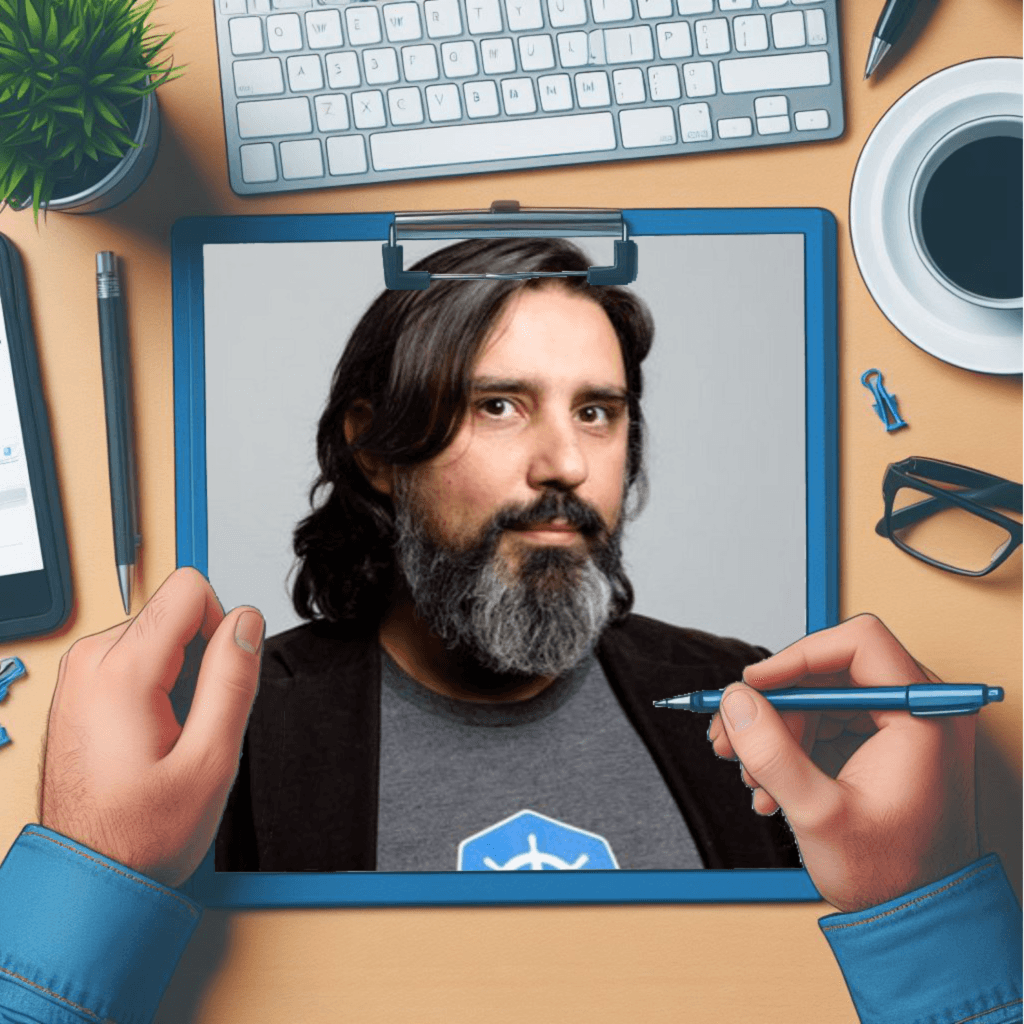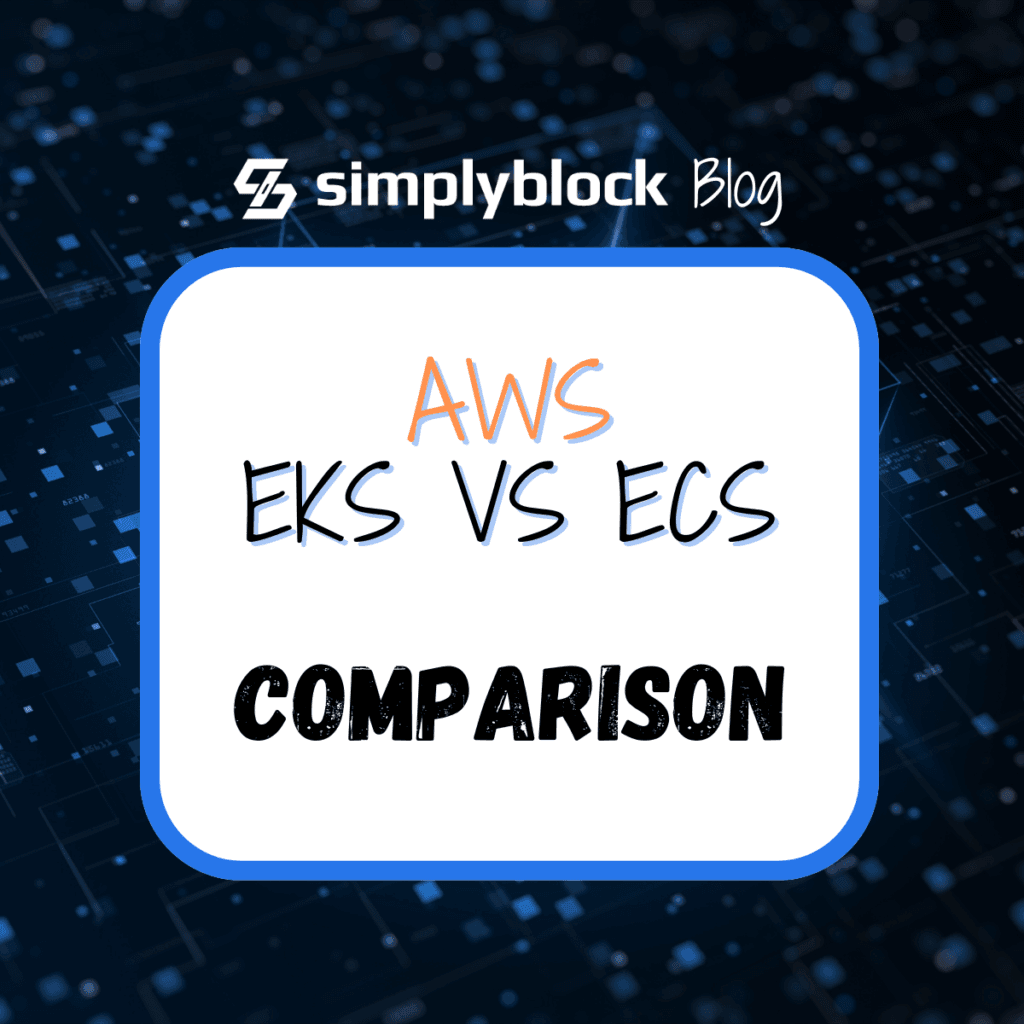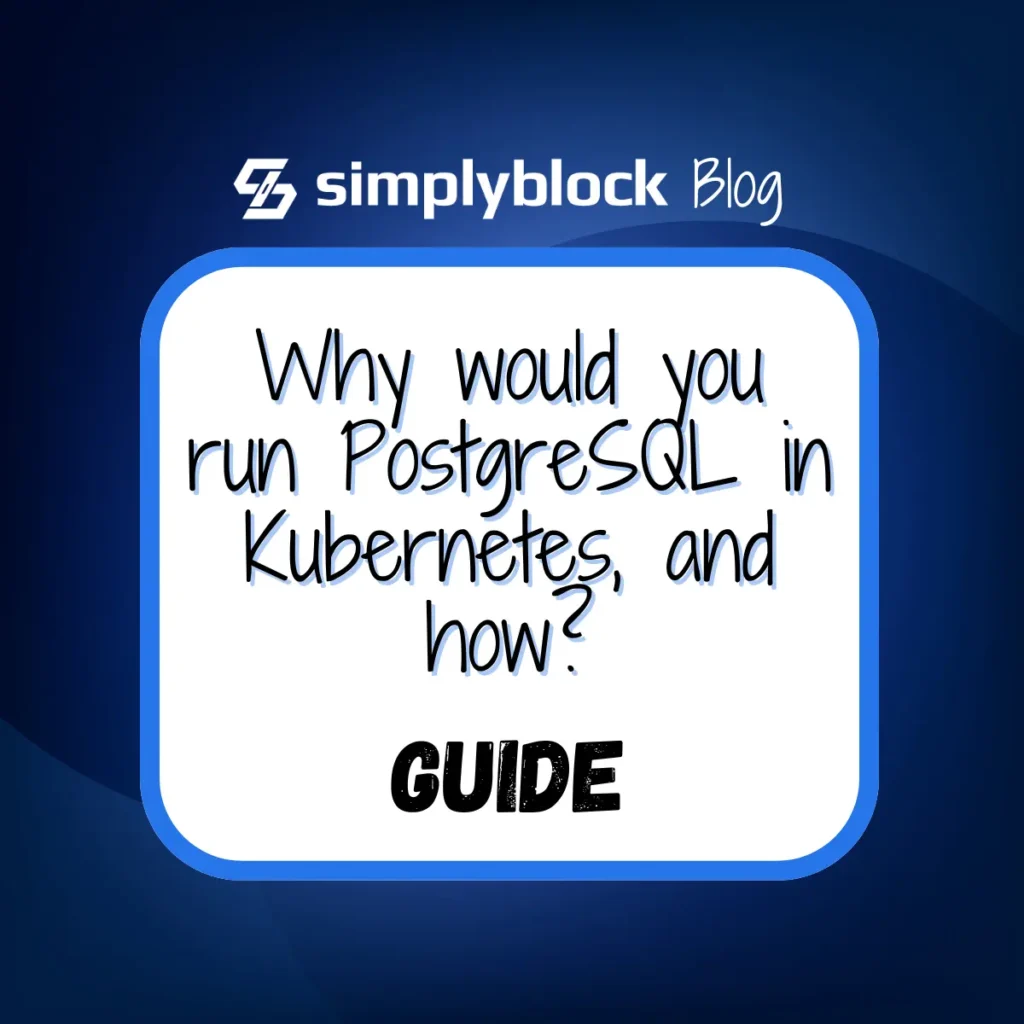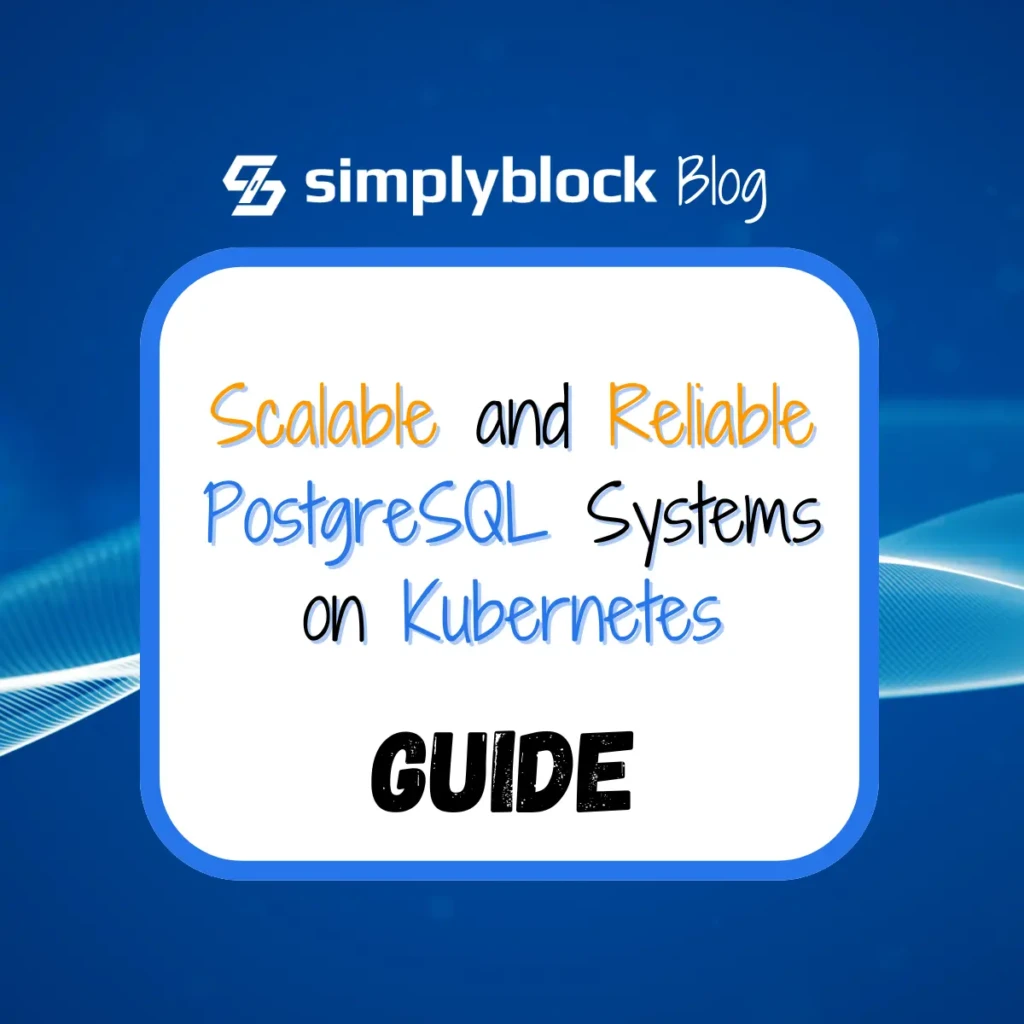Easy Developer Namespaces with Multi-tenant Kubernetes with Alessandro Vozza from Kubespaces
Jun 14th, 2024 | 18 min read

Table Of Contents
This interview is part of the simplyblock’s Cloud Commute Podcast, available on Youtube , Spotify , iTunes/Apple Podcasts , Pandora , Samsung Podcasts, and our show site .
In this installment of podcast, we’re joined by Alessandro Vozza ( Twitter/X , Github ) , a prominent figure in the Kubernetes and cloud-native community , who talks about his new project, Kubespaces, which aims to simplify Kubernetes deployment by offering a namespace-as-a-service. He highlights the importance of maintaining the full feature set of Kubernetes while ensuring security and isolation for multi-tenant environments. Alessandro’s vision includes leveraging the Kubernetes API to create a seamless, cloud-agnostic deployment experience, ultimately aiming to fulfill the promises of platform engineering and serverless computing. He also discusses the future trends in Kubernetes and the significance of environmental sustainability in technology.

Chris Engelbert: Hello, everyone. Welcome back to the next episode of simplyblock’s Cloud Commute podcast. Today, I have another incredible guest. I know I say that every time, but he’s really incredible. He’s been around in the Kubernetes space for quite a while. And I think, Alessandro, the best way is just to introduce yourself. Who are you? What have you done in the past, and what are you doing right now?
Alessandro Vozza: Thank you for having me. Well, I’m Alessandro, yes, indeed. I’ve been around for some time in the cloud-native community. I’m Italian, from the south of Italy, and I moved to Amsterdam, where I live currently, about 20 years ago, to get my PhD in chemistry. And then after I finished my PhD, that’s my career. So I went through different phases, always around open source, of course. I’ve been an advocate for open source, and a user of open source since the beginning, since I could lay my hands on a keyboard.
That led me to various places, of course, and various projects. So I started running the DevOps meetup in Amsterdam back in the day, 10, 11 years ago. Then from there, I moved to the OpenStack project and running the OpenStack community. But when I discovered Kubernetes, and what would become the Cloud Native Computing Foundation, I started running the local meetup. And that was kind of a turning point for me. I really embraced the community and embraced the project and started working on the things. So basically what I do is organize the meetup and organize the KCDs, the Kubernetes Community Days in Amsterdam, in Utrecht, around the country. That kind of led me through a natural process to be a CNCF Ambassador, which are people that represent or are so enthusiastic about the way the Cloud Native Computing Foundation works and the community, that are naturally elected to be the face or the ambassadors for the project, for the mission.
At this moment, I still do that. It’s my honor and pleasure to serve the community, to create, to run monthly meetups and KCDs and help other communities thrive as well. So the lessons learned in the Netherlands, in the meetups and in the conferences, we try to spread them as much as possible. We are always available for other communities to help them thrive as well. So that’s been me in a nutshell. So all about community. I always say I’m an average programmer, I’m an average engineer, but where I really shine is to organize these events and to get the people together. I get a kick out of a successful event where people form connections and grow together. So that’s what drives me in my very core.
Chris Engelbert: I like how you put this. You really shine in bringing engagement to the community, helping people to shine themselves, to grow themselves. I think that is a big part of being a developer advocate or in the developer relations space in general. You love this sharing of information, helping other people to get the most out of it.
Alessandro Vozza: Actually, I used to be, or I still do play the bass, electric bass and double bass. And the bass player stays in the back next to the drummer and he creates the conditions so the other members of the band shine. So the guitar player usually stays in front, the bass player is the guy that stays back and is happy to create the foundations and cover the music to really shine. And that’s maybe my nature. So maybe it reflects from the fact that I always love playing the bass and being that guy in a band.
Chris Engelbert: I love that. That’s a great analogy. I never thought about that, but that is just brilliant. And I actually did the same thing in the past, so there may be some truth to that. So we met a few weeks ago in Amsterdam, actually at AWS Summit Amsterdam.
And I invited you because I thought you were still with the previous company, but you’re doing something new right now. So before that, you were with Solo.io , an API gateway, networking, whatever kind of thing. But you’re doing your own thing. So tell us about it.
Alessandro Vozza: Yeah. So it was a great year doing DevRel and so much fun going and speaking about service mesh, which is something that I really believe it’s going to, it’s something that everybody needs, but I know it’s a controversial, but it’s something that I really, you got to believe in it. You know, when you are a developer advocate, when you represent a company or community, the passion is important. You cannot have passion for something you don’t believe in, for something that you don’t completely embrace. And that was great. And we had so much fun for about a year or a bit more. But then I decided that I’m too young to settle, as always, like I’m only 48, come on, I have a good 10 years of engineering work to do. So I decided that I wanted to work on something else, on something mine, more, more mine, more an idea that I had, and I want to see it develop.
Filling a gap in the market and a real need for developers to have a flexible environment, environments to deploy their applications. So fulfilling the promises of platform engineering as a self-service platform to deploy applications. So the idea goes around the namespace. What is a namespace? Of course, it’s what the unit of deployment in Kubernetes really, it’s this magical place where developers can be free and can deploy their application without the control within the guard rails of whatever the system means, the cluster administrator sets.
But developers really love freedom. So developers don’t want to have to interact even with the sysops or sysadmins. In fact, developers love Heroku. So Heroku, I think, is the hallmark of developer experience where you just can deploy whatever you want, all your code, all your applications in a place and it’s automatically exposed and you can manage by yourself everything about your application.
I want to reproduce that. I want to get inspired by that particular developer experience. But because I love Kubernetes, of course, and because I really believe that the Kubernetes APIs are the cornerstone, the golden standards of cloud-native application deployment. So I want to offer the same experience but through the Kubernetes API. So how you do that, and that’s, of course, like this evolving product, me and a bunch of people are still working on, define exactly what does it mean and how it’s going to work. But the idea is that we offer namespace-as-a-service. What really matters to developers is not the clusters, is not the VMs or the networks or all the necessary evil that you need to run namespaces. But what really matters is the namespace, is a place where they can deploy their application. So what if we could offer the best of both worlds, kind of like the promises of serverless computing, right? So you are unburdened by infrastructure. Of course, there is infrastructure somewhere, the cloud is just somebody else’s computer, right? So it’s not magic, but it feels like magic because of the clever arrangement of servers in a way that you don’t see them, but they are still there.
So imagine a clusterless Kubernetes. The experience of Kubernetes, the API really, so all the APIs that you learn to love and embrace without the burden of infrastructure. That’s the core idea.
Chris Engelbert: So that means it’s slightly different from those app platforms like Fargate or what’s the Azure and GCP ones, Cloud Run and whatever. So it’s slightly different, right? Because you’re still having everything Kubernetes offers you. You still have your CRDs or your resource definitions, but you don’t have to manage Kubernetes on its own because it’s basically a hosted platform. Is that correct?
Alessandro Vozza: Yeah. So those platforms, of course, they are meant to run single individual application pods, but they don’t feel like Kubernetes. I don’t understand. For me, because I love it so much, I think developers love to learn also new things. So developers will love to have a Kubernetes cluster where they can do what they like, but without the burden of managing it. But this CloudRun and ACI and Fargate, they are great tools, of course, and you can use them to put together some infrastructure, but they’re still limiting in what you can deploy. So you can deploy this single container, but it’s not a full-fledged Kubernetes cluster. And I think it’s still tripling in a way that you don’t have the full API at your disposal, but you have to go through this extra API layer. It’s a bespoke API, so you got to learn Cloud Run, you got to learn ACI, you got to learn Fargate, but they are not compatible with each other. They are very cloud specific, but a Kubernetes API is cloud agnostic, and that’s what I want to build.
What we seek to build is to have a single place where you can deploy in every cloud, in every region, in some multi-region, multi-cloud, but through the same API layer, which is the pure and simple Kubernetes API.
Chris Engelbert: I can see there’s two groups of people, the ones that say, just hide all the complexity from Kubernetes. And you’re kind of on the other side, I wouldn’t say going all the way, like you want the complexity, but you want the feature set, the possibilities that Kubernetes still offers you without the complexity of operating it. That’s my feeling.
Alessandro Vozza: Yeah, the complexity lies in the operation, in the upgrades, the security, to properly secure a Kubernetes cluster, it takes a PhD almost, so there’s a whole sort of ecosystem dedicated to secure a cluster. But in Kubespaces, we can take care of it, we can make sure that the clusters are secure and compliant, while still offering the freedom to the developers to deploy what they need and they like. I think we underestimate the developers, so they love to tinker with the platform, so they love freedom, they don’t want the burden, even to interact with the operation team.
And so the very proposal here is that you don’t need an operation team, you don’t need a platform engineering team, it’s all part of the platform that we offer. And you don’t even need an account in Azure or AWS, you can select which cloud and which region to deploy to completely seamlessly and without limits.
Chris Engelbert: Okay, so that means you can select, okay, I need a Kubernetes cluster namespace, whatever you want to call it, in Azure, in Frankfurt or in Western Europe, whatever they call it.
Alessandro Vozza: Yeah. Okay, so yeah, it is still a thing, so people don’t want to be in clouds that don’t trust, so if you don’t want to be in Azure, you should not be forced to. So we offer several infrastructure pieces, clusters, even if the word cluster doesn’t even appear anywhere, because it’s by design, we don’t want people to think in terms of clusters, we want people to think in terms of namespaces and specifically tenants, which are just a collection of namespaces, right? So it’s a one namespace is not going to cut it, of course, you want to have multiple to assign to your teams, to group them in environments like that, prod or test, and then assign them to your team, to your teams, so they can deploy and they’re fun with their namespaces and tenants.
Chris Engelbert: Yeah, I think there’s one other thing which is also important when you select a cloud and stuff, you may have other applications or other services already in place, and you just want to make sure that you have the lowest latency, you don’t have to pay for throughput, and stuff like that. Something that I always find complicated with hosted database platforms, to be honest, because you have to have them in the same region somehow.
Alessandro Vozza: Yeah, that’s also a political reason, right? Or commercial reason that prevents you from that.
Chris Engelbert: Fair, fair. There’s supposed to be people that love Microsoft for everything.
Alessandro Vozza: I love Microsoft, of course, been there for seven years. I’m not a fanboy, maybe I am a little, but that’s all right. Everybody, that’s why the world is a beautiful place. Everybody is entitled to his or her opinion, and that’s all right.
Chris Engelbert: I think Microsoft did a great job with the cloud, and in general, a lot of the changes they did over the last couple of decades, like the last two decades, I think there are still the teams like the Office and the Windows team, which are probably very enterprise-y still, but all of the other ones. For me specifically, the Java team at Microsoft, they’re all doing a great job, and they seem to be much easier and much more community driven than the others.
Alessandro Vozza: I was so lucky because I was there, so I saw it with my own eyes, the unfolding of this war machine of Microsoft. There was this tension of beating Amazon at their own game. Seven years ago, we had this mission of really, really demonstrating that Microsoft was serious about open source, about cloud, and it paid off, and they definitely put Microsoft back on the map. I’m proud and very, very grateful to be here. You have been there, Microsoft joining the Linux Foundation, the Cloud Native Computing Foundation really being serious about Cloud Native, and now it works.
Chris Engelbert: I agree. The Post-Balmer era is definitely a different world for Microsoft. All right, let’s get back to Kubespaces, because looking at the time, we’re at 17. You said it’s, I think it’s a shared resource. You see the Kubernetes as a multi-tenant application, so how does isolation work between customers? Because I think that is probably a good question for a lot of security-concerned people.
Alessandro Vozza: Yeah, so of course, in the first incarnation would be a pure play SaaS where you have shared tenants. I mean, it’s an infrastructure share among customers. That’s by design the first iteration. There will be more, probably where we can offer dedicated clusters to specific customers. But in the beginning, it will be based on a mix of technologies between big cluster and Firecracker, which ensure better isolation of your workload. So it is indeed one piece of infrastructure where multiple customers will throw their application, but you won’t be able to see each other. Everybody gets his own API endpoint for Kubernetes API, so you will not be able. RBAC is great, and it works, of course, and it’s an arcane magic thing and it’s arcane knowledge. Of course, to properly do RBAC is quite difficult. So instead of risking to make a mistake in some cluster role or role, and then everybody can see everything, you better have isolation between tenants. And that comes with a popular project like big cluster, which has been already around for five years. So that’s some knowledge there already.
And even an other layer of isolation, things like Kata Container and Firecracker, they provide much better isolation at the container runtime level. So even if you escape from the container, from the jail of the container, you only can see very limited view of the world and you cannot see the rest of the infrastructure. So that’s the idea of isolating workloads between customers. You could find, of course, flaws in it, but we will take care of it and we will have all the monitoring in place to prevent it, it’s a learning experience. We want to prove to ourselves first and to customers that we can do this.
Chris Engelbert: Right. Okay. For the sake of time, a very, very… well, I think because you’re still building this thing out, it may be very interesting for you to talk about that. I think right now it’s most like a one person thing. So if you’re looking for somebody to help with that, now is your time to ask for people.
Alessandro Vozza: Yeah. If the ideas resonate and you want to build a product together, I do need backend engineers, front-end engineers, or just enthusiastic people that believe in the idea. It’s my first shot at building a product or building a startup. Of course, I’ve been building other businesses before, consulting and even a coworking space called Cloud Pirates. But now I want to take a shot at building a product and see how it goes. The idea is sound. There’s some real need in the market. So it’s just a matter of building it, build something that people want. So don’t start from your ideas, but just listen to what people tell you to build and see how it goes. So yeah, I’ll be very happy to talk about it and to accept other people’s ideas.
Chris Engelbert: Perfect. Last question, something I always have to ask people. What do you think will be the next big thing in Kubernetes? Is it the namespace-as-a-service or do you see anything else as well?
Alessandro Vozza: If I knew, of course, in the last KubeCon in Paris, of course, the trends are clear, this AI, this feeding into AI, but also helping AI thrive from Cloud Native. So this dual relationship with the Gen AI and the new trends in computing, which is very important. But of course, if you ask people, there will be WebAssembly on the horizon, not replacing containers, but definitely becoming a thing. So there are trends. And that’s great about this community and this technologies that it’s never boring. So there’s always something new to learn. And I’m personally trying to learn every day. And if it’s not WebAssembly, it’s something else, but trying to stay updated. This is fun. And challenges your convention, your knowledge every day. So this idea from Microsoft that I learned about growth mindset, what you should know now is never enough if you think ahead. And it’s a beautiful thing to see. So it’s something that keeps me every day.
Now I’m learning a lot of on-premise as well. These are also trying to move workloads back to the data centers. There are reasons for it. And one trend is actually one very important one. And I want to shout out to the people in the Netherlands also working on it is green computing or environmental sustainability of software and infrastructure. So within the CNCF, there is the Technical Advisory Group environmental sustainability, which we’re collaborating with. We are running the environmental sustainability week in October. So worldwide events all around getting the software we all love and care to run greener and leaner and less carbon intense. And this is not just our community, but it’s the whole planet involved. Or at least should be concerned for everybody concerned about the future of us. And I mean, I have a few kids, so I have five kids. So it’s something that concerns me a lot to leave a better place than I found it.
Chris Engelbert: I think that is a beautiful last statement, because we’re running out of time. But in case you haven’t seen the first episode of a podcast, that may be something for you because we actually talked to Rich Kenny from Interact and they work on data center sustainability, kind of doing the same thing on a hardware level. Really, really interesting stuff. Thank you very much. It was a pleasure having you. And for the audience, next week, same time, same place. I hope you’re listening again. Thank you.
Alessandro Vozza: Thank you so much for having me. You’re welcome.



